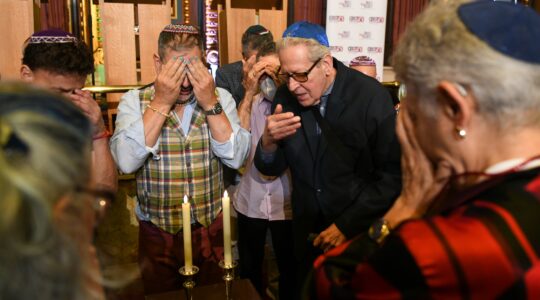Navonel Glick is the chief operating officer of IsraAid, an Israeli-based aid agency that provides disaster-response to major humanitarian crises worldwide and assists in international development. It is now assisting refugees fleeing war-ravaged Syria.
Glick, who has dual Israeli-Canadian citizenship, served for three years as the group’s program director, leading the group’s Israeli Arab and Jewish aid workers on disaster-response missions to such places as the Philippines after Typhoon Haiyan, Sierra Leone after the Ebola outbreak, and Northern Iraq after the emergence of Islamic State. We caught up with him by phone last week.
Q.: How have you responded to the Syrian refugee crisis?
A.: We have had a medical and trauma response team on the beaches in Crete for the last six months. We also have three teams on the beaches of Lesvos in Greece where more than 1 million refugees have come in the last 14 or 15 months. In October, during the peak of the migrant movement, up to 10,000 people were coming every day for a total of 200,000 arriving in October alone. They had paid smugglers and went on an extraordinarily difficult, dangerous journey.
How was your staff able to communicate with the refugees?
We had Christians, Muslims, Druze and Jews on the ground who were able to speak Arabic and who come from a related culture. All are Israeli. The United Nations asked us to be the lead organization offering grief care and grief counseling for the families of the victims of shipwrecks. We have been proud to have delivered six babies on the beaches. These families keep in touch with us. The first mother to give birth was Hanan, a 22-year-old from Syria. After she and her little son, Ahmed, arrived in Germany, she sent pictures to the Jewish Israeli doctor who delivered her son.
Do the refugees know you are all Israelis?
We wear T-shirts with our logo, which contains the Israeli flag. Some are a bit surprised, but we have had only incredibly touching, moving interactions with the refugees themselves. We have seen their textbooks that show us as monsters. Once they meet us, they discover otherwise. There is nothing quite like this personal interaction. … There is a whole mentality shift.
Are there other countries in which you are working with the refugees?
I was in Iraq and Jordan. Our job as an organization is to help those living in camps and outside of camps to provide them with food, water, hygiene kits, clothing, blankets and mattresses. In Iraq, we provided for over 25,000 people.
When did your work in Iraq start?
In September 2014, and it continues to this day. We focus on the most vulnerable, including unaccompanied minors. We are there to support the existing government and civil society efforts — the other nonprofits that are already there. We also provide educational help, helping the education system by using a curriculum called STEM, which is an acronym for science, technology, engineering and math. It is used in Israel and the U.S. to create more of a practical link between the very basic education received in the makeshift schools set up in the camps and the reality of their lives outdoors. There is a need to help this population that is mostly idle. There is not much to do in the camps to develop one’s mind or creativity, so STEM education is a practical way of helping students connect what they learn about the world and the actual world they live in.
How old are the children you work with?
There is a range, from young children to those at the junior high level. We focus on providing about 100 teachers with the tools needed so they can impact the students. And we supervise their work with the students — over 2,500 children in three schools. This is being done as a pilot project that started in 2015. We are now starting a yearlong intensive program at the three schools to check its effectiveness.
The New York Jewish Week brings you the stories behind the headlines, keeping you connected to Jewish life in New York. Help sustain the reporting you trust by donating today.




